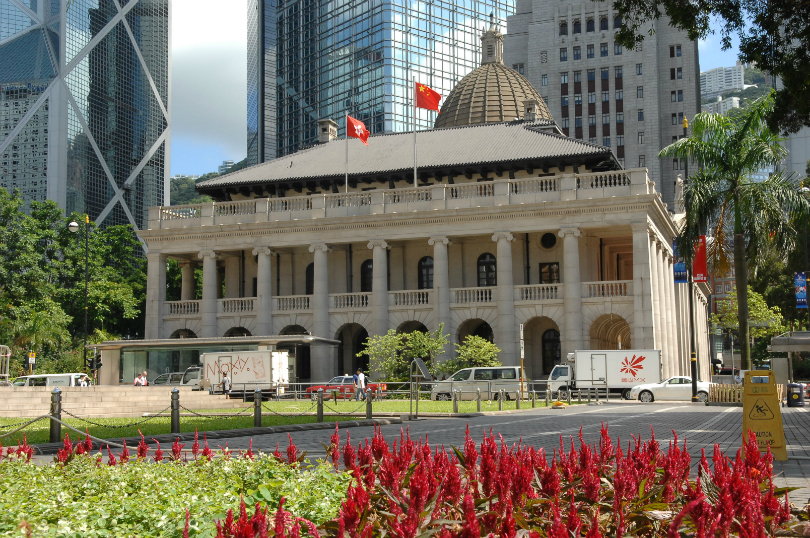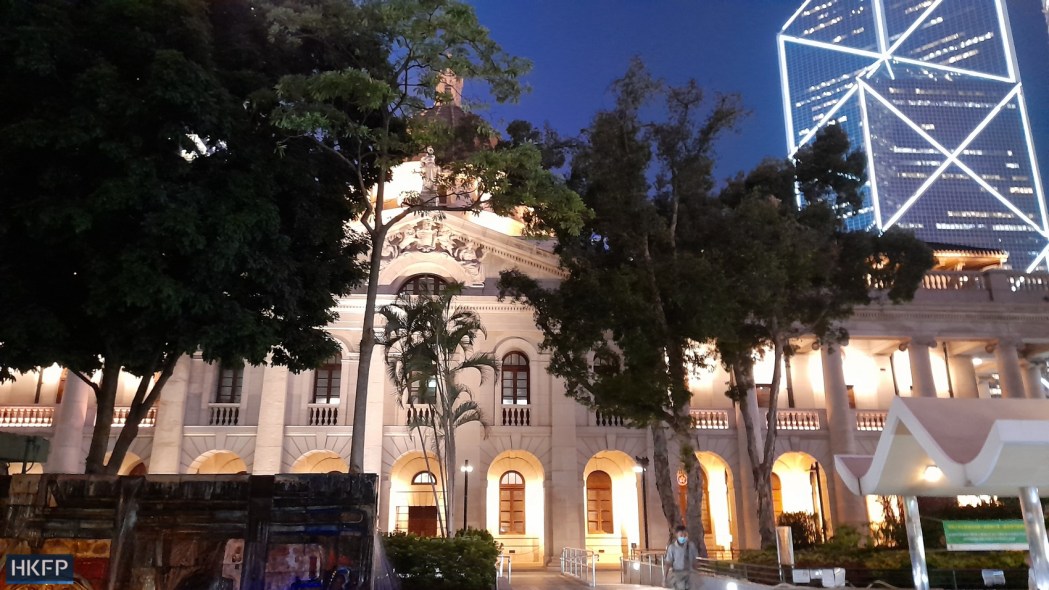By Ronald Chiu
In his 18-page statement on essential principles governing the administration of justice in Hong Kong, Chief Justice Geoffrey Ma takes us through the constitutional backdrop to the rule of law, the independence of the judiciary, and the impartiality of judges, etc, etc, etc, alongside many other substantive rules of our cherished legal system.
Not included among the topics was the separation of powers.

For nearly a month, that was the question which had impinged upon the public consciousness: do we or do we not possess such a thing as a separation of powers? Our Chief Executive tells us: no, we haven’t, never had one and never will. The Bar Association points out that we’ve always had it and still do. More politically inclined people will probably say something along the lines that it doesn’t really matter if the deer is in fact a deer so long as they can make you call it a horse.
The fact which has perhaps been obscured by this so-called debate is that a clear legal answer does exist and no one is in a better position to give it than the judiciary. Where is it?
There is in wide circulation online a video of a slightly harried-looking Chief Justice darting out of the Court of Final Appeal and into his car to avoid having to answer a single, simple question from the swarm of reporters outside. The video is quite recent and the question was a familiar one: does a separation of powers (still) exist in Hong Kong?
A month has passed and still no word from the judiciary.
A charitable explanation for this conspicuous – some might say deafening – silence is that the separation of powers is an idea that comes so naturally to our common law judges that they really see no need to defend it. That would have been marginally plausible had there not been a public debate on that very subject raging outside the judiciary’s soundproof walls.

In the opening of his statement, Mr Ma explains why he has chosen to write at all: “In view of the commentaries, opinions and criticisms in relation to recent decisions of the courts, particularly at the Magistrates’ Court level, involving the conviction or acquittal of defendants and the granting or refusal of bail, the Judiciary wishes to remind the community of certain basic, essential principles governing the administration of justice in Hong Kong. The proper administration of justice is crucial to the existence of the rule of law.”
So that is why he neglects to make any mention of the separation of powers, because the statement is not about the high politics of legitimate government – it’s about the proper administration of justice. Except, of course, while the judiciary has found time to introduce commendable new measures to increase the transparency of court decisions and complaints,
it has not released any other statement to explain where it draws the line on the separation of powers.
The fact of the matter is that the judiciary is entirely content to turn a blind eye to the unprecedented and quite frankly, malicious claims from our Chief Executive, backed by her illustrious masters in the Hong Kong and Macau Affairs Office and the Central Government’s Liaison Office — that the separation of powers has never existed in Hong Kong.
What it does very much take exception to a few laypeople from either side of the political spectrum making certain remarks to the effect that certain magistrates in certain political cases have at certain times been inclined to show bias. With regard to the separation of powers issue it has chosen resolutely to say nothing, and with regard to the second issue our Chief Justice himself has sprung to the defence.’

At the risk of appearing incautious, it would appear to me, putting it bluntly, that the priorities of the judiciary are not at present, with the greatest possible respect, reflective of the current realities of the legal and political system in Hong Kong.
Which brings me to the fundamental problem with Mr Ma peddling this venerable ideal of judges being these impartial arbiters of justice, suspended far above the malaise of worldly affairs, pronouncing their judgement in a vacuum of human feeling, revealing naught but truth, and meting out no more and no less than each of our just deserts.
In a world where laws can be bent, promulgated without consent, where eminent foreign judges retire to wash their hands of the national security regime, where judges can be hand-picked by our Chief Executive, where, every week, news reaches us of overworked and overzealous magistrates piling vitriol upon the heads of misguided youths, where cooperative judges are co-opted into the parallel jurisdiction of national security courts, any discourse that ends or begins with the proposition that “judges must be impartial” is simply a non-starter.
Bias exists at the best of times. Mr Ma, quite sensibly, does not go so far as to deny that judges as a matter of fact can be partial. Judicial stereotyping with regard to race and gender are, after all, well-recorded from all across the world.
What is more, as in virtually every other common law jurisdiction in the world, the average judge in Hong Kong is well-educated, politically conservative, middle class and male. This combination of characteristics coupled with their relative homogeneity means that in cases of public controversy and in times of great political turmoil, judges will have a marked tendency to look unfavourably on activists and protestors. That is nothing new.

The reason why some people out there are now levelling criticisms at some judges for their perceived lack of impartiality is not, as Mr Ma seems to be insinuating in his final paragraph, that they are uninformed, that they make mere assertions, or that they are motivated by spite because the judgments of those judges are not to their liking. It is not, as he concludes, that criticism of judges and the courts cause detriment to public confidence in the administration of justice.
Public confidence in the administration of justice has plunged because judges are seen to have failed to take a stand for the principles of the rule of law that, over the last year, have been continually ravaged at the hands of Beijing, and by extension, the executive. Criticisms of judges and the courts are not the cause of that decline in public confidence, they are but symptoms.
The fact that laypeople are the most vocal critics in any given legal system cannot be attributed to ignorance. Criticisms of judicial independence and impartiality almost never come, at least publicly, from lawyers. That is so because the people best-equipped to judge judicial impartiality or the lack thereof, the practitioners, are simultaneously the people least able to make public comments on the system, for they too are part of it. Were it otherwise, there would be no shortage of lawyers who would come forth to the press with horror stories of demented judges or prejudged cases, especially with regard to public order offences.
In any case, the fact that our Chief Justice’s reaction to accusations of judicial bias was to assume that the accusers were ignorant and uninformed is revealing: it speaks volumes about the innate humanity of judges. We are but human, even the best of us. That is why we aspire towards a world ruled by laws and not men.
One of the cardinal rules of good writing is to show and not to tell. Mr Ma tells us that judges must be impartial. Mr Ma shows us that in reality, as impartial as they aspire to be, even the most senior and eminent of judges will consciously avoid matters in which, while a clear legal answer does exist, the matter is so politically charged that giving the truthful answer would earn Beijing’s ire. That is why in 2014 he had no qualms about spelling out the existence of the separation of powers, but now maintains this watchful silence. Such is the example he sets.

One could say, in his defence, that aside from those few select political warzones, our judiciary does do a good enough job of staying independent. That’s a reasonable enough proposition, but one that Bar Association chairman Philip Dykes pre-empted months ago when he said, “You can’t be slightly independent any more than you can be slightly pregnant. You’re either independent or you’re not.” That was in the context of the Chief Executive’s power to select judges for national security cases, but the basic idea is one and the same.
In a way, its silence is itself an answer. Not willing to lower themselves to join in the chorus that the deer is a horse, nonetheless our judiciary does not have it in it to point out to Beijing’s face that the deer is, and always has been, a deer.
And one mustn’t blame them. As Mr Ma rightly notes in the very first section of his statement, under the Basic Law independent judicial power is something that China’s National People’s Congress authorises the HKSAR to enjoy. “The courts and judges cannot derogate from their responsibilities as contained in this document.” Where it counts, Beijing is absolute. In this unenviable position, given an impossible choice between capitulation and challenge to central authority, it has, very sensibly, chosen self-preservation.
But if that is the final answer from the judiciary, it is deeply disappointing. Not an answer that a system of justice that has established itself for over 150 years as a beacon of rectitude and fairness should feel able to give, and certainly not to a people who have given up so much that they can rule and be ruled justly.
I can only hope, as many others will, that the day will come that our judiciary finally awakens from its stupor: to draw the line where the line actually is, to point out to the sovereign that the deer is not a horse, and to show us, the public, justice in action. And that it will not come too late.
Ronald Chiu is a writer and student in Hong Kong. He is an editor of the Anti-Extradition Law Publication of the University of Hong Kong. He has written on law and politics for the Financial Times, the International Herald Tribune and the South China Morning Post.
Support HKFP | Policies & Ethics | Error/typo? | Contact Us | Newsletter | Transparency & Annual Report | Apps
Help safeguard press freedom & keep HKFP free for all readers by supporting our team
| HKFP is an impartial platform & does not necessarily share the views of opinion writers or advertisers. HKFP presents a diversity of views & regularly invites figures across the political spectrum to write for us. Press freedom is guaranteed under the Basic Law, security law, Bill of Rights and Chinese constitution. Opinion pieces aim to point out errors or defects in the government, law or policies, or aim to suggest ideas or alterations via legal means without an intention of hatred, discontent or hostility against the authorities or other communities. |

More HKFP OPINION:
HKFP has an impartial stance, transparent funding, and balanced coverage guided by an Ethics Code and Corrections Policy.
Support press freedom & help us surpass 1,000 monthly Patrons: 100% independent, governed by an ethics code & not-for-profit.










